Physical Address
304 North Cardinal St.
Dorchester Center, MA 02124
Physical Address
304 North Cardinal St.
Dorchester Center, MA 02124

The Best and Latest in Conservative Thought
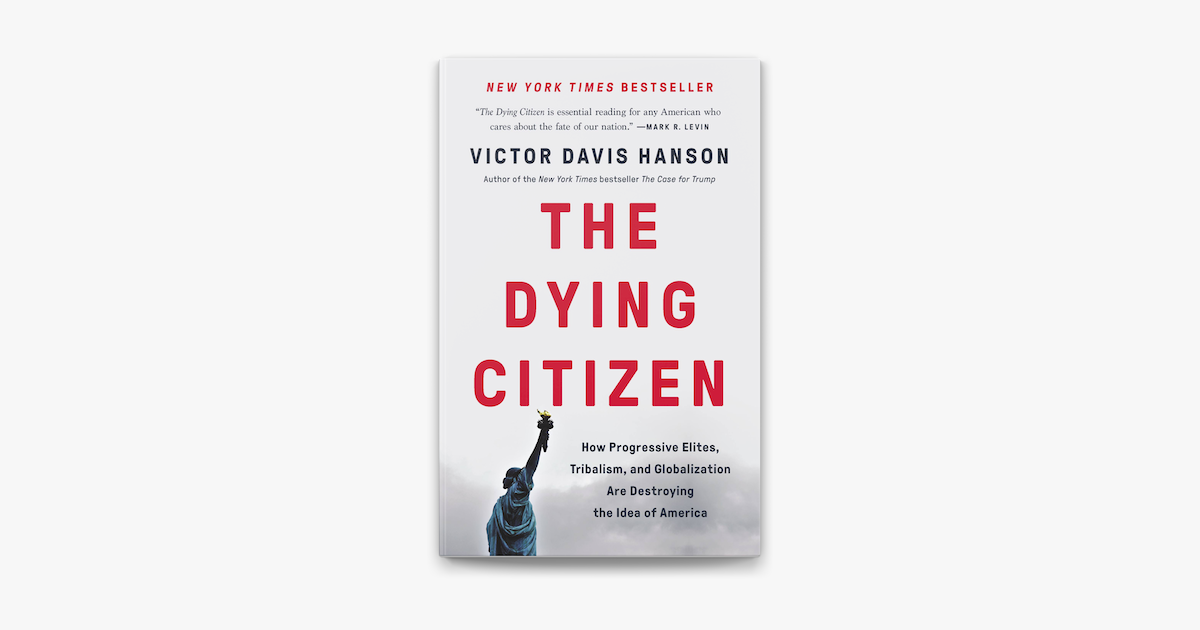
America’s preeminent military historian, Victor Davis Hanson has written dozens of books on everything from war during classical times, to the modern era. He’s also penned numerous books highly critical of Leftist ideologies and defending President Donald Trump.
Currently Hanson is the Martin and Illie Anderson Senior Fellow at the Hoover Institution. He’s also a syndicated columnist for Tribute Media Services and a weekly columnist for National Review Online. During his career he has taught at Stanford, Pepperdine and the US Naval Academy. He holds a PhD in classics from Stanford.
The End of Everything: How Wars Descend into Annihilation
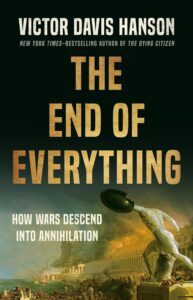
War has the power to resolve conflicts, dethrone tyrants, and alter the course of civilization—sometimes to its breaking point. From the fall of Troy to the devastation of Hiroshima, instances where war has resulted in complete annihilation have echoed through history, marking the end of political systems, cultures, and eras. Despite the passage of time, human nature remains unchanged, and modern societies are not exempt from the horrors of total war.
In The End of Everything, military historian Victor Davis Hanson explores a series of sieges and sackings from antiquity to the New World conquests, illustrating how societies can descend into barbarism and destruction. Through the accounts of Thebes, Carthage, Constantinople, and Tenochtitlan, Hanson vividly portrays the drama, violence, and folly of war. He underscores the naivety of the defeated and the wrath that led to mass slaughter, delivering a stark warning to contemporary readers. Hanson urges us to learn from the lessons of history’s obliterations to avoid repeating such catastrophic mistakes.
The Dying Citizen: How Progressive Elites, Tribalism, and Globalization Are Destroying the Idea of America
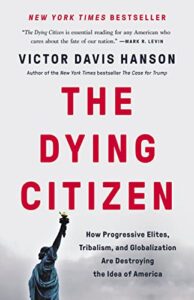
While being a citizen might not sounds overly special, over the centuries its been incredibly rare. For most of civilization the overwhelming majority of people were subjects, peasants or even slaves.
So the Left’s attack on what makes America great is, in essence, an attack on the most fundamental element of the Republic: being a citizen. This is the argument posted by Victor Davis Hanson in his latest and most powerful book.
Hanson goes on to argue that the concept of a citizen is under attack – from every side. The erosion of the middle class has led to an increasing dependence on the government. An overreaching bureaucracy threatens personal liberty at every step. And an open borders policy fundamentally dilutes what it means to be a citizen of the United States.
The Left is looking to tear down America and the focus of their attack is the most fundamental element of a free state: the individual.
The Second World Wars: How the First Global Conflict Was Fought and Won
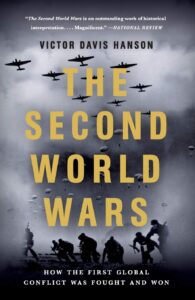
A unique take on World War II from an expert in military history, Victor Davis Hanson details how the first truly global war had a unique barbarity, but surprising similarities to many wars before it.
The Case for Trump

Esteemed historian Victor Davis Hanson puts his reputation on the line by making a bold case to defend President Donald Trump.
First, Hanson details how it is that a real estate mogul and celebrity managed to beat out the vastly better-funded and more knowledgeable opponents, despite an onslaught of attacks from the corporate media. Then he goes on to highlight how Trump’s intuition and defence of the common man brought about his successful election and shockingly successful presidency.
But more than that, Hanson makes the case that Trump’s victory and the sweeping changes he made in a short period of time were what America needed most.
Forward by Mark R Levin.
The Savior Generals: How Five Great Commanders Saved Wars That Were Lost – From Ancient Greece to Iraq
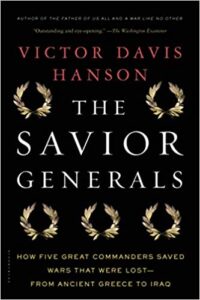
Five pocket biographies of military men who changed history forever.
One of the world’s leading military historians Victor Davis Hanson makes the case that war is seldom straightforward and that a swing to victory often comes as a result of an unforeseen event, or decision.
In this book, Hanson makes the case for five generals who saved their countries from defeat by their singular action.
He then weaves a thread between them all, highlighting their unique origins, often arising from outside the established hierarchy, their ability to use radical tactics, and their common trait of having a short-lived career.
What made these men so similar and how did they change history forever?
Carnage and Culture: Landmark Battles in the Rise to Western Power
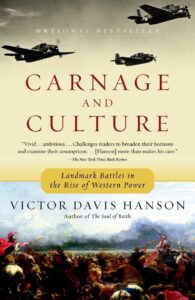
In liberty is victory. That, essentially, is the thesis of historian Victor Davis Hanson’s impressive dive into nine of the greatest battles in history.
From the Greek’s defeating the slave army of Xerxes to the counter attack to the Tet offensive, the West has dominated warfare for millennia and not just because of geography or superior technology. In fact, Hanson argues that the fundamental reason the West has remained victorious is because of a unique combination of personal liberty and a culture that values innovation. And that culture gives the West a fundamental upper hand on the battlefield.
A War Like No Other: How the Athenians and Spartans Fought the Peloponnesian War
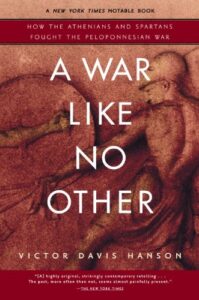
Flexing his military history muscle, Victor Davis Hanson has taken Thucydides’ history of the Peloponnesian War and added layers upon layers of context. A brilliant work for those who crave more than just a passing overview of the events, Hanson provides background to events, details techniques of war and gives insight into the personal and horrifying aspects of battles, and the lives of key players like Pericles and Lysander. More than that, he gives greater cultural context, weaving in the importance of artists like Aristophanes and philosophers like Sophocles and Plato.
A more complete telling of the Peloponnesian War hasn’t existed, ever.
From there Hanson goes a step further to add relevance to these events, comparing the battles between Athens and Sparta to modern day conflicts like those between the US and Russia, the America Civil War, Vietnam, the Middle East and more.
The Father of Us All: War and History, Ancient and Modern

Victor Davis Hanson has long been acclaimed as one of our leading scholars of ancient history. In recent years he has also become a trenchant voice on current affairs, bringing a historian’s deep knowledge of past conflicts to bear on the crises of the present, from 9/11 to Iran. “War,” he writes, “is an entirely human enterprise.” Ideologies change, technologies develop, new strategies are invented-but human nature is constant across time and space. The dynamics of warfare in the present age still remain comprehensible to us through careful study of the past. Though many have called the War on Terror unprecedented, its contours would have been quite familiar to Themistocles of Athens or William Tecumseh Sherman. And as we face the menace of a bin Laden or a Kim Jong-Il, we can prepare ourselves with knowledge of how such challenges have been met before.
The Father of Us All brings together much of Hanson’s finest writing on war and society, both ancient and modern. The author has gathered a range of essays, and combined and revised them into a richly textured new work that explores such topics as how technology shapes warfare, what constitutes the “American way of war,” and why even those who abhor war need to study military history. “War is the father and king of us all,” Heraclitus wrote in ancient Greece. And as Victor Davis Hanson shows, it is no less so today.
Ripples of Battle
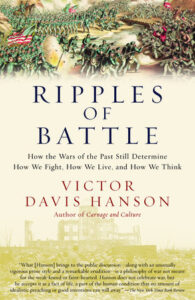
War has a lasting impact, in more ways than you can guess. In this compelling book Victor David Hanson details how victories, defeats, notable heroes and tragic circumstances frame our culture for hundreds of years to come.
Mexifornia: A State of Becoming

Immigration and immigrants can be a wonderful thing, but that isn’t always the case. Historian Victor David Hanson details how open borders in California have brought about a fundamental change to that state and how the losers aren’t just the generational Californians like himself, but those who have risked everything to come to America for a better life.
An eternal optimist, Hanson does outline how integration with society and adoption of fundamental American principles can save California from its poor leaders.
The Western Way of War: Infantry Battle in Classical Greece

A compelling take on the origin of Greek war and its ties to Greek culture in general, Victor Davis Hanson outlines how the innovation of the infantry coincided with and reflected the political idea of the time: the people.
The End of Sparta: A Novel
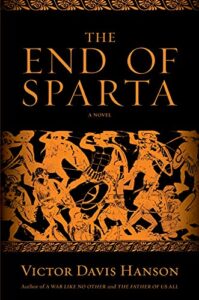
Giving new meaning to the term “historical novel” Victor Davis Hanson takes his expert knowledge of ancient Greece and pens a powerful tale. With the immense detail that only an expert can provide, Hanson’s hero leaves his peaceful farming life to become a soldier and liberate those enslaved by the Spartans.
Other Greeks: The Family Farm and the Agrarian Roots of Western Civilization

Always one to stand convention on its head in “The Other Greeks” Victor Davis Hanson documents the unsung heroes of Greek civilization: the independent family farm.
These “other Greeks” he argues formed the backbone of Hellenic civilization and it’s is their values that gave Greek culture its unique focus on private property, constitutional government, infantry warfare and individual rights.
Hanson then goes on to compare this unique historical feature to a very similar social structure in American society and posits that the success of the family farm is critical to the success of society as a whole. Less so in its makeup and more so in its cultural contributions to a a society based on self-reliance, honesty, skepticism and a healthy suspicion of the urban elites.
Bonfire of the Humanities: Rescuing the Classics in an Impoverished Age
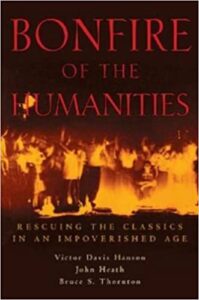
A student and professor of classics, Victor David Hanson along with his two co-authors sound the alarm that the study of classics is disappearing and detail why. From there they go on to argue for a return to what they call “academic populism,” freely learning from the great works and the lessons they have taught us, and refocusing on how these great lessons can help us today.
For even more Victor Davis Hanson books see here.